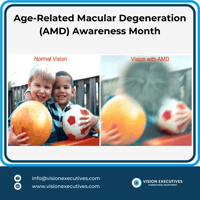📢 February is Age-Related Macular Degeneration Awareness Month 👁️ Age-Related Macular...
𝐀𝐝𝐯𝐚𝐧𝐜𝐞𝐦𝐞𝐧𝐭𝐬 𝐢𝐧 𝐏𝐞𝐝𝐢𝐚𝐭𝐫𝐢𝐜 𝐄𝐲𝐞𝐜𝐚𝐫𝐞 𝐓𝐞𝐜𝐡𝐧𝐨𝐥𝐨𝐠𝐲🔬👁️🗨️
Haag-Streit has introduced the Eyesi Indirect Ophthalmoscope ROP Simulator, a groundbreaking tool aimed at refining the training of ophthalmologists. Specifically designed for retinal examinations in preterm infants and the classification of retinopathy of prematurity (ROP), a leading cause of preventable childhood blindness worldwide, this simulator integrates a high-fidelity training system. Medical residents can now practice device handling and make crucial decisions in a lifelike yet safe environment. With a 3D simulation of the patient's eye, precise alignment of the ophthalmoscope mimic, handheld lens, and patient’s eye is vital for visualizing the retina, enhancing proficiency in this critical aspect of paediatric ophthalmology training.
Meanwhile, in Singapore, cases of severe myopia among children have nearly doubled over the past decade, according to the Singapore National Eye Centre (SNEC). Currently, up to 20 percent of children exhibit high myopia, defined as more than 500 degrees in each eye, compared to just around 10 percent ten years ago. Children as young as six are now requiring glasses, a notable shift from the previous average age of 12. Associate Professor Marcus Ang, head of the corneal and refractive surgery departments at SNEC, attributes this rise to a lack of outdoor time, with more children immersed in digital devices and increased screen time, especially due to the integration of such devices into school curricula. The COVID-19 pandemic has exacerbated this trend, with both parents and children becoming more reliant on screens for education and communication. However, Professor Ang highlights recent advancements in myopia control, ranging from specialised glasses and contact lenses to innovative eye drops that can slow myopia progression in children, offering a glimmer of hope amidst the concerning trend.
Several other companies have created a variety of technologies and devices customised to meet the specific requirements of infant eyecare, encompassing retinal imaging, vision screening, and more. These companies include: Heidelberg Engineering, Topcon Healthcare, Visionix USA (formerly Luneau Technology USA & Optovue Inc.), NIDEK USA, Welch Allyn, CLARITY MEDICAL SYSTEMS, Plusoptix, Inc., and more.


